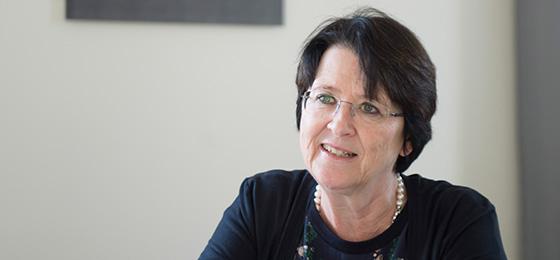"I can see no alternative to the multilateral path”

Streams of refugees, global warming, the Euro crisis – it seems we spend our time arguing about our problems in marathon negotiations when we should really be solving them instead. But appearances are deceptive, says the historian Madeleine Herren-Oesch. Interview by Anita Vonmont
(From "Horizons" no. 108 March 2016)
Prof. Herren-Oesch, these days the big international conferences often end without any binding agreement. Declarations of intent seem to be the best they can muster. Will we ever again put our money where our mouth is, like back in 1987 when we agreed on a worldwide ban on the CFC propellants that destroy the ozone layer?
It’s become more difficult to reach really concrete, binding decisions, that’s true. Today there are a lot more players involved than there were 30 years ago. It’s not just the politicians and diplomats of the West who decide things at the negotiating table. Developing countries and emerging economies are important too, and have to be taken to task. International civil society and its interest groups are also involved in the debate. Regional differences have to be accounted for. So the negotiations are complex, as are the grounds for making decisions. And this makes it more difficult to find a consensus.
At the climate summit in Paris last December, an agreement was signed by 195 countries, and this was regarded as a success. Is that how you see it too?
It depends on how you look at it. It’s certainly a success in that the different countries were able to agree on ambitious climate goals. But at the same time it’s an open question as to just how binding the wording of the agreement is, and whether the signatory states will actually implement what they’ve promised.
Can this multilateral path really lead us to our goal?
I simply see no alternative. In a globalised world, individual players can’t be responsible for the problems, nor should they be. Struggling to negotiate the best possible solutions with broad support is the only way forward.
What’s the best way of achieving this? For example, how can the EU countries find their way to a rapid allocation formula for refugees?
There’s no magic formula for this. Such negotiations are difficult and protracted. But even if negotiations at the EU level don’t bring about any concrete results, this doesn’t mean they’ve been a failure. Decisions don’t depend exclusively on international agreements but develop through political discussions, and these have clearly sensitised many people to the problem. The welcoming culture we’ve seen in Germany has really impressed me. I was surprised how quickly even the German universities opened up after the arrival of the first Syrian refugees. The Berlin Senate simply overturned the existing study ban for refugees in the space of 14 days! Quite unexpectedly, this has initiated an integration process that’s really important, even though nothing was decided at the EU level.
Do we still need reforms to enable the EU, the UN and international conferences to act more effectively?
Yes, we do, but those reforms are in part already happening. The big international players need societal legitimisation. We need to prevent people from being unsettled by complexity and from feeling threatened by the many different levels of action that are open to us. These should instead be seen as an opportunity. For example, Europe is often depicted as if it’s in decline, overwhelmed by refugees and on the point of economic collapse. And yet after the end of the Cold War, Europe achieved something that is remarkable when compared with the rest of the world, namely a peaceful political transformation, with a reunited Germany integrated in the EU. Even if nationalistic tendencies and the terrorist threat are cause for concern today, Europe remains an example of how we can deal peacefully with the very different demands placed upon us.
Madeleine Herren-Oesch is a professor of modern general history and is the director of the Institute for European Global Studies in Basel. Her field is Europe’s interconnectedness in a global context and, in particular, the history of international organisations.
Anita Vonmont is a science journalist in Basel.